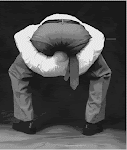So I was watching Frost/Nixon the other day, having seen it once before, and I couldn't shake this odd feeling.
Sure, the movie's good. It's a compelling story, well acted, well directed, and mounted with seriousness of purpose. But still, you know, something was missing.
Too soon?
Then, when the movie was getting closer to the end, and much of the action was taken up by verbatim recreations of the actual Nixon interviews, it finally hit me:
This. This interview part. This is the most interesting part of the movie. It's the only reason you give a shit. It's about these two men talking, sparring, fighting verbally with each other. Why can't the whole movie just be this?
I mean, sure, the backstory is interesting. I know quite a lot more about Richard Nixon than I really care to, to be honest with you, having read at least somewhat in depth on, you know, that whole plumbers/CIA/Cambodia/Ellsberg/break-in/cover-up thing.
But that really gets to the heart of what's wrong with Frost/Nixon. By being made now, when most people have no fucking clue who David Frost is and a the only thing people know about Richard Nixon is that he had to resign the presidency because of something called Watergate.
Not the most attractive man, either.
By having to give all the background, Frost/Nixon robs you of some of the story's essential power -- these two men talking to each other. One, a venal interviewer stepping up to the plate for the first (and it must be said, only) time in his career (even though Frost himself admits that the "interviewer beating down the interviewee" aspect of the mythology about the interviews is totally overblown, giving primary credit to the behind-the-scenes prodding of Nixon's handlers for Nixon's confessions). And the other, a fallen president, trying desperately to stop himself from going down in history as a cheat, liar and failure, before finally admitting, yeah, he was kind of a cheat, liar and failure.
So as I've said, the interview recreations are the most interesting part of the movie. And though Michael Sheen and Frank Langella do a fine job as Frost and Nixon, respectively (though I'm personally more partial to Anthony Hopkins' portrayal of Nixon in Oliver Stone's, uh, Nixon), the truth is it's just not as good as the actual interview.
I mean, how could it be? What could live up to the actual pain and anguish on Nixon's face as he describes what went on in his last days in office? Or the way he skirts on the razor's edge of, well, truthiness, in his claims that obstructing justice must have a criminal intent, and, well, he had no criminal intent, only political intent, and that makes everything OK (no really, if you listen, that's pretty much what he's saying).
Anyhow, the point of all this is that I actually found a 97 minute feature condensing the Nixon interviews into their most interesting and gripping sections (which I think is part of the DVD release, though I could be wrong about that).
Anyhow, I found this version to be more interesting than the movie, especially if you already have the basic idea of what happened. So enjoy, those of you with 97 minutes to spare, and enjoy Thanksgiving.













